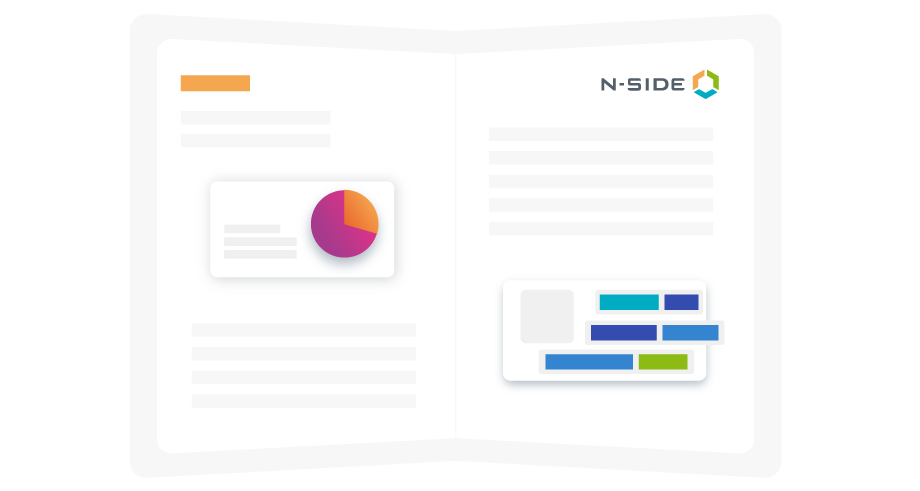Professional Services
Whether your challenge can be solved by our existing products or requires the development of new analytics solutions and market design approaches, our team is ready to help.
How N-SIDE helps DSOs take the most of various sources of flexibility simultaneously: the EUniversal Project

.png)
European and worldwide cleaner energy ambitions are high. N-SIDE has been at the forefront of several technology improvements around international energy and balancing markets. This has been done notably by relying on tools to support System Operators developed thanks to its deeptech DNA.
In the past decade, N-SIDE has been more involved in accompanying DSOs in their new role, especially around local markets through several key projects such as the LEM-Cornwall project, SmartNet, CoordiNet, and Localflex.
All these projects are paving the way for a reliable and sustainable future, avoiding huge investments in avoidable grid reinforcements.
The risk: unstructured IT setup due to all actors developing very close but different protocols
Nevertheless, numerous actors, ourselves included, launching uncoordinated initiatives can swiftly result in an excessively disorganized IT setup, which is undesirable for three reasons:
-
For DSOs starting a contract with a market platform provider, adopting its API (Application Programming Interface) and graphical interface can slowly generate a vendor lock-in effect due to high switching costs.
-
Furthermore, this unstructured setup prevents DSOs from easily leveraging other flexibility sources contracted without an intermediary or through another market platform (active in the same grid area) due to the requirement of using a custom API specific to each provider.
-
Finally, the situation would not be ideal for most market platforms either. In fact, only the first service provider with high market power will make a profit in this situation. Challengers and new entrants willing to quickly scale with competitive offers will also suffer from the vendor lock-in effect.
Other alternatives, like letting DSOs impose their own API requirements have their own drawbacks since market platforms can become more expensive due to higher customization costs. Moreover, many DSOs that are less experienced with flexibility market procurement could have difficulties setting up optimal API requirements.
A standard to build strong foundations
EUniversal, a 10 MEUR project pushed by the European Commission, has the purpose of dealing with that unstructured IT setup before it is too late! Together, grid operators, universities, research institutes, European associations, and commercial market platform providers are joining forces to build a meaningful standard, easily replicable in new markets.
The solution: rely on strong foundations built today instead of applying a lot of hot-fix patches by 2030 when we will not have the same design freedom as we have now.
The project differs from other European ones by proposing a concrete solution and testing it on the field. Indeed, it gives a practical answer to the question “How to make several market platforms work simultaneously in a given area and ensure competition among local markets?”
N-SIDE's contribution to this project is threefold: co-crafting the standard with all other partners, extending the existing flexibility toolbox by proposing an innovation tool called the N-SIDE Optimal Bid Recommender (OBR), and delivering an advanced market platform relying on the developed standard.
Testing the standard on the field and in different locations
To prove the feasibility of the crafted standard and to test new flexibility mechanisms, three demonstrators located in three different countries of Europe are set up. Proceeding in this manner guarantees that the standard is adaptable to countries with varying geographical shapes, energy mix, and the distribution of the energy mix across the grid. In other words, to ensure this standard is agnostic of the specificities linked with the network operator and its grid relying on it.
This project has received funding from the European Union’s Horizon 2020 research and innovation programme under grant agreement No 864334.
This article reflects only the N-SIDE view. The European Commission Innovation and Networks Executive Agency is not responsible for any use that may be made of the information it contains.
Co-Author
Louise Adam is an Energy Optimization Analyst at N-SIDE. Louise holds a Master's degree in Applied Mathematics from UCLouvain (Belgium) during which she focused on machine learning and optimization. At N-SIDE she has contributed to multiple projects around energy markets and flexibility.
The Euniversal Series
The new local consumption and production patterns from residential consumers pose significant challenges for DSOs in managing their power grid. To avoid costly reinforcements in order to cope with very local issues, relying on residential flexibility is envisioned through market approaches.
The EUniversal project proposes to rely on a common standard at European level to ease market interactions. Adopting it will prevent an unstructured IT setup that leads to vendor lock-in, hindering flexibility and market competition before it is too late.
Through this series, learn more about the problem, how the solution was designed and how it is used by major DSOs in Europe.
- How N-SIDE helps DSOs take the most of various sources of flexibility simultaneously: the EUniversal project
- The UMEI - How a European standard is simplifying DSO interactions with local markets.
- How can a DSO manage simultaneously grid planning, scheduled maintenance and congestion management via market solutions?
- How to reconcile the sensitivity of system operator data with efficient grid-aware markets?
This project has received funding from the European Union’s Horizon 2020 research and innovation program under grant agreement No 864334.
This article reflects only the N-SIDE view. The European Commission Innovation and Networks Executive Agency is not responsible for any use that may be made of the information it contains.



About the Author
Pierre is an Engineer and Economist active in market-oriented activities at N-SIDE. He has contributed to some Euphemia R&D achievements and to the deployment of our Power Matching Algorithm in India. He has also worked for system operators by designing and delivering solutions for local and balancing markets. Pierre is now the Product Manager of the N-SIDE Power Matching Algorithm, shaping how our market clearing offer can evolve to allow even more end-consumers worldwide to get access to cheaper and cleaner electricity.
Pierre Crucifix




Other content like this one...

Article
N-SIDE provides algorithm to the Nordic grid operators, to anticipate imbalances in electricity production and consumption
Revolutionizing Nordic Energy: N-SIDE's Algorithm Powers Precise Imbalance Forecasting. Discover how N-SIDE collaborates with Nordic TSOs to predict electricity production and consumption imbalances, ensuring efficient reserve management. Explore the game-changing impact on renewable integration and cost savings.
READ MORE
article
Power Market Auctions 101
Understand the basics of power market auctions: The economic principles useful for understanding power markets and auctions, how European power markets are organized, what is the welfare optimization and why it is important, and what is meant by crossing the supply and demand.
Read more
ARTICLE
How do modern power market auctions work?
Learn about what the inputs and outputs are of a market clearing algorithm, the main design elements of auctions, the electricity prices and volumes are computed in practice, and the main challenges in computing prices and how we overcome them.
READ MORE









